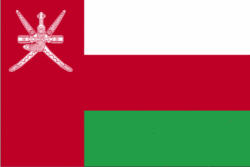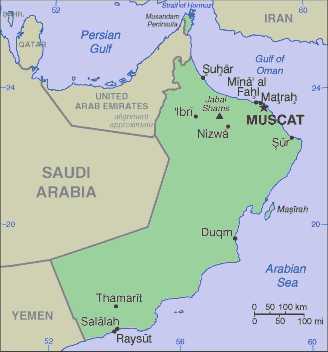Traveling Luck for Oman. Oman, Asia
Oman is located in Middle East, bordering the Arabian Sea, Gulf of Oman, and Persian Gulf, between Yemen and UAE.
Land in Oman is central desert plain, rugged mountains in north and south.
Omani land covers an area of 212460 square kilometers which is slightly smaller than Kansas
Oman has borders with United Arab Emirates for 410km, Saudi Arabia for 676km and Yemen for 288km.
 Omani national flag (Flag of Oman)
Omani national flag (Flag of Oman)
As for the Omani climate; dry desert; hot, humid along coast; hot, dry interior; strong southwest summer monsoon (May to September) in far south.
Omani(s) speak Arabic (official), English, Baluchi, Urdu, Indian dialects.
Places of note in Oman
 Omani map
Omani map
Regions of Oman
In 1970, QABOOS bin Said al-Said ousted his father and has ruled as sultan ever since. His extensive modernization program has opened the country to the outside world and has preserved a longstanding political and military relationship with the UK. Oman's moderate, independent foreign policy has sought to maintain good relations with all Middle Eastern countries.
Oman is a middle-income economy in the Middle East with notable oil and gas resources, a substantial trade surplus, and low inflation. Work on a new liquefied natural gas (LNG) facility progressed in 2005 and will contribute to slightly higher oil and gas exports in 2006. Oman continues to liberalize its markets and joined the World Trade Organization (WTO) in November 2000. To reduce unemployment and limit dependence on foreign labor, the government is encouraging the replacement of foreign expatriate workers with local workers. Training in information technology, business management, and English support this objective. Industrial development plans focus on gas resources, metal manufacturing, petrochemicals, and international transshipment ports. In 2005, Oman signed agreements with several foreign investors to boost oil reserves, build and operate a power plant, and develop a second mobile phone network in the country.
Omani natural resources include petroleum, copper, asbestos, some marble, limestone, chromium, gypsum, natural gas
strategic location on Musandam Peninsula adjacent to Strait of Hormuz, a vital transit point for world crude oil
Omani religion is Ibadhi Muslim 75%, Sunni Muslim, Shi'a Muslim, Hindu.
Natural hazards in Oman include summer winds often raise large sandstorms and dust storms in interior; periodic droughts.
Travel Advice for Oman
OmanSUMMARY
- You should be aware of the threat from terrorism. Al Qa’ida continues to issue statements threatening to carry out attacks in the Gulf region. These include references to attacks on Western interests, including residential compounds, military, oil, transport and aviation interests.
- You should review your security arrangements carefully. You should remain vigilant, particularly in public places. You should avoid any large gatherings or demonstrations.
- Around 95,000 British tourists visit Oman every year. The main type of incident for which British nationals require consular assistance in Oman is for road related incidents.
- We strongly recommend that you obtain comprehensive travel and medical insurance before travelling. You should check any exclusions, and that your policy covers you for the activities you want to undertake. Please see: Travel Insurance.
SAFETY AND SECURITY
Many areas of the Gulf are highly sensitive, including near maritime boundaries and the islands of Abu Musa and the Tunbs in the southern Gulf. Vessels entering these areas have been detained and inspected; and there have been occasional arrests. Mariners should make careful enquiries before entering these waters or considering visiting ports.
LOCAL LAWS AND CUSTOMS
Seat belts must be worn in the front seats and you are not allowed to use a mobile phone whilst driving (you can be given an on-the-spot fine). Speed limits are clearly posted on major roads. There is a minimum 48 hours in jail for any traffic offence in which the driver tests positive for alcohol. (The legal blood alcohol level in Oman is close to zero). Traffic laws in Oman are strictly imposed.
The import (even temporary) of right hand drive vehicles is not allowed.
Oman is a Muslim state and Islamic customs, in public, are strictly observed.
In public, general modesty of behaviour and dress is expected. Women who wear shorts or tight-fitting clothes, in particular in downtown areas, are likely to attract unwelcome attention. There have been some reported cases of sexual harassment.
The import and use of narcotics and obscene material are forbidden and can lead to imprisonment. There are severe penalties for drug offences including, in some cases, the death penalty. "Soft" drugs are treated as seriously as "hard" drugs. Possession of cannabis, even in quantities of less than one gram, will bring a minimum prison sentence of 12 months followed by deportation. Non-Muslims can import alcohol, to a maximum of 2 litres per family. It can be bought at a duty free shop at the airport on arrival, but within Oman, alcohol can be purchased only by personal licence or at licensed hotels and restaurants. Pork products are available at specially licensed food outlets.
Homosexual behaviour is illegal in Oman.
ENTRY REQUIREMENTS
- A one-month combined tourist/business visa costing 6 Omani Rials (OR). This can be extended for one month for a further 6 OR;
- A one year multiple entry visa, which is valid for three weeks, after which nationals must leave Oman for at least three weeks before returning. The cost for this is 10 OR.
HEALTH
GENERAL

 Search
Search Oman country profile
Oman country profile Travel advice for Oman
Travel advice for Oman